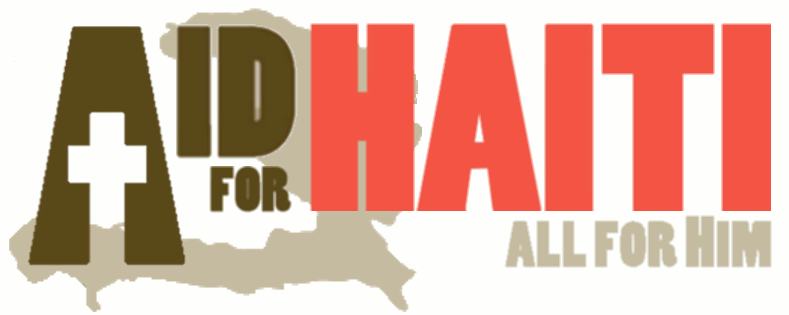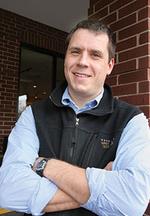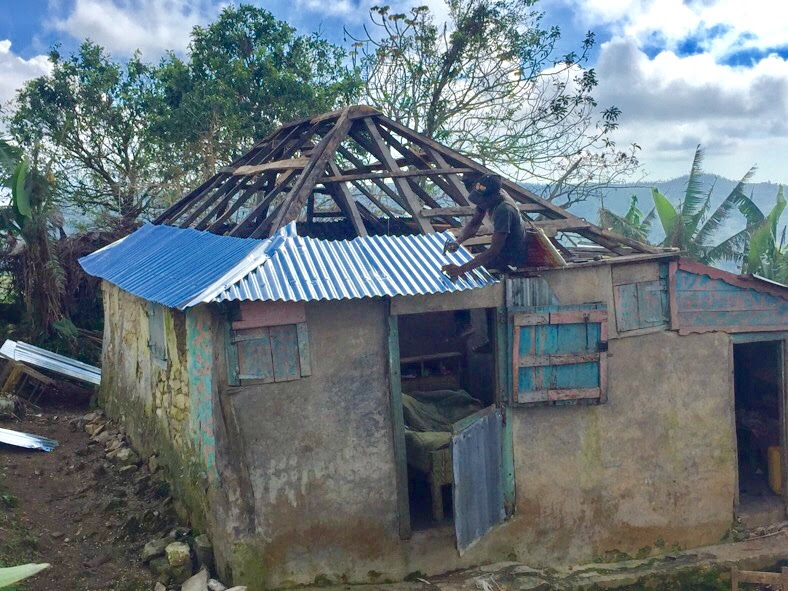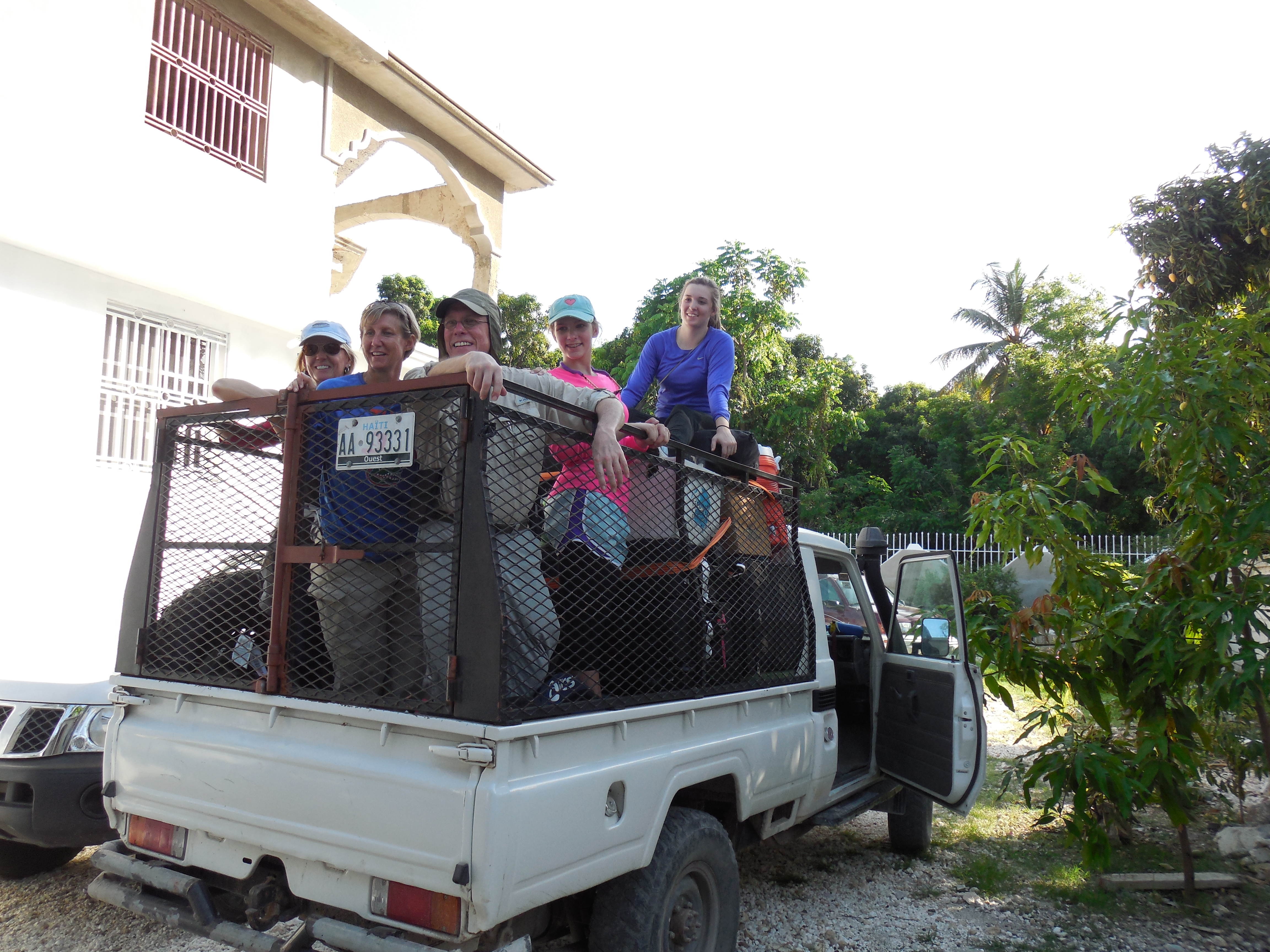
|
||||
 |
||||
| Dr. Caleb Trent, along with other physicians & missionaries, formed Aid To Haiti a year prior to the earthquake. (click for larger version) | ||||
March 05, 2010
Talking over coffee back in St. Louis, Dr. Caleb Trent of Kirkwood smiles with a kid’s air of optimism. Full of energy, he hardly seems haggard after returning from a medical mission to Haiti, where he oversaw treatment of some 300 patients daily at a makeshift comprehensive care clinic.
“It was daunting to see that many waiting for us to open. I remember wishing the Lord could be there to touch those in the crowds, as in the Bible,” Trent said.
Trent, an emergency room resident physician at Barnes-Jewish Hospital, aided medical response efforts after the earthquake – first in Carrefour, near Port-au-Prince, and then in Petit-Goave, 42 miles southwest of the devastated Haitian capital.
He and wife Anna live in downtown Kirkwood with their two young sons. Trent has two more years to go at Barnes-Jewish but hopes to stay in the area after completing his residency requirements, he said.
Right after the earthquake, he and a team of medical professionals/missionaries that had co-founded the relief agency Aid for Haiti a year before raised funds to buy supplies to outfit a makeshift clinic.
Trent, fellow Barnes-Jewish resident physician Chett Schrader, his wife Ashley, businessman/missionary/Aid for Haiti board member Philip Rudolph and his son Michael jumped to action on behalf of the Haitians they had grown to love since founding Aid for Haiti.
Helping underserved Haitians in mountain regions between Port-au-Prince and Jacmel before the earthquake, Trent and fellow University of Tennessee medical students Elliott Tenpenny (now an e.r. physician at the Mayo Clinic) and Philip Sutherland learned to rough it as needed when visiting the island on medical missions.
“We’d carry medicine and supplies in five-gallon buckets for hours up the mountainside to reach the villagers,” Trent said.
Aid for Haiti then zeroed in on those hard-to-reach areas without medical clinics.
After the earthquake, Trent and team finally settled in where the need seemed greatest — a former Wesleyan compound near the damaged Notre Dame hospital in Petit Goave.
Usually, the clinic serves 150,000 patients from around the general area, Trent said. The earthquake upped the numbers served daily by hundreds.
Various medical professionals from different U.S. locales and from around Haiti staffed the Wesleyan clinic, though not with regularity, he said.
He ended up running the open-air clinic while there with a semi-retired ob-gyn doctor from Florida.
All sorts of cases needed attention: Trent remembers being moved by one, in particular — a man with a skull fracture from a traffic accident. He had an exposed brain, and Trent flew with him to the makeshift University of Miami clinic on the Port-au-Prince airport runway for emergency treatment.
“Thankfully, the man responded to treatment, so the medical staff at the U. of Miami clinic sent him to Miami for further care,” Trent said.

|
||||
 |
||||
| After the earthquake, Trent and team settled in a former Wesleyan compound near the damaged Notre Dame hospital in Petit Goave. (click for larger version) | ||||
Another man in respiratory distress after a water jug fell on his chest responded to makeshift methods to give him air.
“I found myself opening his chest up on a stretcher under coconut trees,” said Trent.
The tents blocking mangos and coconuts from hitting people proved as necessary to health as many other measures, said Trent.
After the Petit-Goave mayor demanded some clinic tents for civil affairs, the U.S. Marines built a wood structure the Wesleyan medical staff used for added privacy.
Aid for Haiti staff planned to build another wood clinic in the weeks after Trent staffed the unit, he said.
More medical staff from Barnes-Jewish traveled to the Petit-Goave clinic after receiving an e-mail from Trent asking for help if possible: physician residents Jonathan Heidt (and wife Elizabeth), Amanda Cannarozzi, Joy English, Jacob Keeperman, Amy Kroeger and attending physician Lisa Halcomb (and father).
Barnes-Jewish resident Cannarozzi said she was extremely scared to serve in Haiti, given the safety concerns she’d heard about in the news.
“The scene in Haiti was indescribable,” she said. Cannarozzi lives with husband Dante in University City. “I’d spent time in underdeveloped countries before, but I’ve never seen such poverty as down there. Trash was everywhere. “
The Haitian people, however, showed beautiful spirit, she said.
She said she was moved when a woman who’d lost a baby in childbirth thanked Cannarozzi for all she did in doctoring her.
“I felt horrible that I couldn’t save her baby, yet she thanked me and said I did a great job,” Cannarozzi said.
Working 20 to 22-hour days, Cannarozzi said the situation sometimes verged on the surreal.
One night a local pastor helped Cannarozzi and other medical workers break into the Notre Dame Hospital for an urgent c-section, she said. The Spanish Armada helped resuscitate the baby after the birth.
It took Cannarozzi days to catch up on sleep after returning to St. Louis.
“The mission workers gave everything they had. I saw overwhelming acts of kindness. It restored my faith in humanity,” she said.
Trent said Aid for Haiti, the non-profit he helped found, will phase out service at the Wesleyan Camp on March 15. The group will base Haitian operations after that at a compound seven kilometers away, built some time ago by an Assembly of God church but never much used, he said.
A husband-wife team from the Dominican Republic will staff the new base for the next couple of months, Trent said. He and other doctors will work there when possible as well.
The last delivery Trent handled at the Wesleyan compound convinced him of the Haitian people’s resiliency, he said.
“A woman sang throughout her labor then rode off with her baby on a motorcycle a half hour later,” he said. “That’s tough.”





Published by